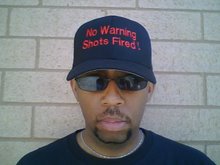Reopening Old Wounds
Paul Scott
April 21st is Holocaust Remembrance Day, a day set aside to remember the the Jews who suffered under the Nazi regime. No one can fault an ethnic group for honoring the deaths of millions of its brothers and sisters. However, as a descendant of those who experienced their own African Holocaust I find myself, selfishly, asking "what about us ?"
My feeling of unapologetic, self centeredness has become more pronounced in the aftermath of the Obama Administration's bowing to Jewish pressure and deciding to boycott the UN World Conference Against Racism, an event that would have, initially,allowed issues important to African Americans such as reparations and the Trans Atlantic Slave Trade to be presented on the world stage. This was especially hurtful to a black community that had the misconception that the nations first African American president would give their issues a fair hearing.
For many blacks, this opened up an old wound; Jewish issues taking precedence over African American concerns.
Very few people argue over the death toll of six million Jews during their Holocaust, however for African Americans it is much different. The number of African people who were brought to America is conservatively estimated at 40 Million. How many Africans perished during the 400 years of the slave trade and the following years of European colonialism the world may never know. Reason being, the concern for people of color pales in comparison to concern for people with white skin.
There is only room for one "most persecuted" group and the Jews aren't sharing that spotlight with anyone.
Some of the best critiques of Black-Jewish relations were written by Harold Cruse in his books "Crisis of the Negro Intellectual" and "Plural but Equal." Cruse points out that contrary to popular belief, there was no real African American-Jewish alliance prior to 1913. It was not until the trial of Leo Frank, a Jewish man, convicted for murder based on the testimony of a black man and later lynched by a white mob that Jewish Americans developed any solidarity with the plight of black people. Prior to that the Jews were just as ambivalent towards the plight of blacks as other white folks.
But this fact is not discussed for fear of being labeled an anti-semite.
Black anti -semitism is , in itself, a misnomer. If you look at the actual definition of a Semite, it can apply to members of many ethnic groups of the Afro-Asiatic world; a fact that is conveniently left out of discussions.
If anything, African Americans are Jew phobic. There is a fear, whether real or imagined that if you say anything against Jewish people, something very bad is going to happen to you.
Part of this fear is theological.
Since the enslaved Africans, in this country, were forbidden to read the Bible, they were unable to develop a theology that placed their struggle in the context of the Divine Being's master plan. Therefore, any group that claims the title of "God's Chosen people" is readily accepted by African Americans, without question. This places them at a distinct disadvantage when dealing with other cultures which have historically made their culture synonymous with their religion.
The fear has also been socio-politically based.
There is a fear among African Americans that being labled an "enemy to the Jews" could result in anything from losing a political office, getting evicted from one's home to being blacklisted by any industry having a high Jewish ownership.
Whether real or imagined, these fears are not, totally, without precedent and the animosity over the control that many believe Jews exert over black lives remains.
Despite the good that Minister Louis Farrakhan and the Nation of Islam have done cleaning up drug infested, black neighborhoods any positive comments about the ministry are blocked by charges of anti-semitism. In the political realm, Rev. Jesse Jackson had his presidential runs of the 1980's severely impacted by the charge. Also during this period, politicians such as former Chicago political aid, Steve Cokely, lost his job because of charges of making anti-Jewish statements.
Black entertainers have been affected, as well. At the top of his popularity, "the King of Pop" Michael Jackson was dethroned by Jewish activists for mouthing the lyrics "Jew me, sue me" on the controversial song "They Don't Care About Us." Also, many believe that it is more than a coincidence that the top rated Arsenio Hall Show was canceled shortly after the appearance of Min. Louis Farrakhan on the program.
As uncompromising as Hip hop claims to be, even it has been impacted. During the late 80's, the rap group Public Enemy came under intense scrutiny for comments that group member Professor Griff, allegedly, made that offended Jewish leaders. Even Sean "Puff Daddy" Combs had to censor the lyric "stack chips like Hebrews" from the hit record "All About the Benjamins." The irony being that calls from African American women for rappers to recording misogynistic lyrics fall on deaf ears.
While the calls often go out to open channels of dialogue between the black and Jewish communities, this cannot be done without open and honest communication. Before we can move forward, we have to heal the old wounds of the past. This can only be done by cultural education which must begin with an African American community that has little knowledge of its own history.
Unfortunately, the African American scholars who have been capable of bringing historical clarity to the issue like Dr. Tony Martin and Dr. Leonard Jeffries have, themselves, been demonized as anti-Semites.
On April 21st millions of Jews will repeat the phrase, never forget!" Unfortunately, for African Americans, we cannot forget that which we have never been allowed to learn.
Paul Scott writes for No Warning Shots Fired.com He can be reached at info@nowarningshotsfired.com or (919) 451-8283

